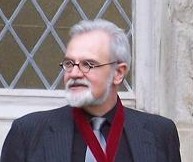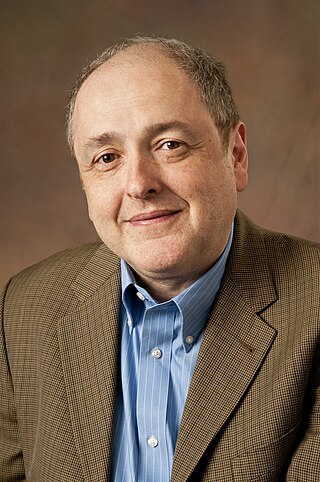Related Research Articles
Contemporary philosophy is the present period in the history of Western philosophy beginning at the early 20th century with the increasing professionalization of the discipline and the rise of analytic and continental philosophy.

Robert Merrihew Adams was an American analytic philosopher, who specialized in metaphysics, philosophy of religion, ethics, and the history of early modern philosophy.

The Faculty of Arts & Science is a division of the University of Toronto which offers arts and science teaching and research institutions. With more than 27,000 undergraduate and 4,500 graduate students, Arts & Science represents over half the student population on the downtown campus.
The Kenneth P. Dietrich School of Arts and Sciences is one of the 17 schools and colleges of University of Pittsburgh in Pittsburgh, Pennsylvania. A direct descendant of the 1787-chartered Pittsburgh Academy, and the oldest part of the university, the school serves as "the liberal arts core" of the university; some 30 departments and programs provide instruction in natural sciences, humanities, and social sciences to all students at the Pittsburgh campus in Oakland. The school is the largest graduate school in the Pittsburgh area.

Noël Carroll is an American philosopher considered to be one of the leading figures in contemporary philosophy of art. Although Carroll is best known for his work in the philosophy of film, he has also published journalism, works on philosophy of art generally, theory of media, and also philosophy of history. As of 2012, he is a distinguished professor of philosophy at the CUNY Graduate Center.

The University of California, Riverside, is organized into three academic colleges, two professional schools, and two graduate schools. These units provide 81 majors and 52 minors, 48 master's degree programs, and 42 PhD programs. It is the only UC campus to offer undergraduate degrees in Creative Writing and Public Policy, and one of only three UCs to offer an undergraduate degree in Business Administration. Additionally, UCR's doctoral program in the emerging field of Dance theory, founded in 1992, was the first program of its kind in the United States. UCR's various academic units are as follows:
Philosophers' Imprint is a refereed philosophy journal.

Anita LaFrance Allen is the Henry R. Silverman Professor of Law and professor of philosophy at the University of Pennsylvania Law School. She was formerly Vice Provost for Faculty from 2013 to 2020.

Carlin Romano is an American writer and educator. Romano writes for The Chronicle of Higher Education.
William Irwin is Professor of Philosophy at King's College in Wilkes-Barre, Pennsylvania and is best known for originating the "philosophy and popular culture" book genre with Seinfeld and Philosophy: A Book about Everything and Nothing in 1999 and The Simpsons and Philosophy: The D'oh! of Homer in 2001.

Brian Leiter is an American philosopher and legal scholar who is Karl N. Llewellyn Professor of Jurisprudence at the University of Chicago Law School and founder and Director of Chicago's Center for Law, Philosophy & Human Values. A review in Notre Dame Philosophical Reviews described Leiter as "one of the most influential legal philosophers of our time", while a review in The Journal of Nietzsche Studies described Leiter's book Nietzsche on Morality (2002) as "arguably the most important book on Nietzsche's philosophy in the past twenty years."

Berit Oskar Brogaard is a Danish–American philosopher specializing in the areas of cognitive neuroscience, philosophy of mind, and philosophy of language. Her recent work concerns synesthesia, savant syndrome, blindsight and perceptual reports. She is professor of philosophy and runs a perception lab at the University of Miami in Coral Gables, Florida. She was also co-editor of the Philosophical Gourmet Report until 2021.

Amélie Oksenberg Rorty was a Belgian-born American philosopher known for her work in the philosophy of mind, history of philosophy, and moral philosophy.
Elisabeth Camp is a professor of philosophy at Rutgers University. Camp's work has focused on forms of thought and speech that do not fit standard propositional models. She has written extensively about figurative speech such as sarcasm and metaphor, arguing that these forms of speech force listeners to reconsider their standard methods of delineating the difference between what is meant and what is said.
Carrie Ichikawa Jenkins is a Canadian philosopher who holds a Canada Research Chair and is Professor of Philosophy at the University of British Columbia. She is also a professor at the Northern Institute of Philosophy, University of Aberdeen. Her primary research areas are epistemology, metaphysics, philosophy of logic, philosophy of language, and philosophy of mathematics. She is one of the principal editors of the journal Thought.

The New York University Department of Philosophy offers B.A., M.A., and Ph.D. degrees in philosophy, as well as a minor in philosophy and a joint major in language and mind with the NYU Departments of Linguistics and Psychology. It is home to the New York Institute of Philosophy, a research center that supports multi-year projects, public lectures, conferences, and workshops in the field, as well as outreach programs to teach New York City high school students interested in philosophy.
The Collegium of Black Women Philosophers (CBWP) is an organization which was created to increase the visibility of black women in the field of philosophy and to allow greater networking and mentoring opportunities for these women. The organization is currently based at Penn State University.

The Department of Philosophy is an academic division in the Faculty of Arts and Humanities at King's College London. It is one of the largest and most distinguished centres for the study of philosophy in the United Kingdom.

The feminist philosophy journal Hypatia became involved in a dispute in April 2017 that led to the online shaming of one of its authors, Rebecca Tuvel, an assistant professor of philosophy at Rhodes College in Memphis. The journal had published a peer-reviewed article by Tuvel in which she compared the situation of Caitlyn Jenner, a trans woman, to that of Rachel Dolezal, a white woman who identifies as black. When the article was criticized on social media, scholars associated with Hypatia joined in the criticism and urged the journal to retract it. The controversy exposed a rift within the journal's editorial team and more broadly within feminism and academic philosophy.
The Department of Philosophy at Harvard University is a philosophy department in Cambridge, Massachusetts, United States that is associated with the Harvard Faculty of Arts and Sciences. Housed at Emerson Hall, the department offers bachelor's, master's and doctorate degrees in philosophy. Both undergraduate and graduate students can complete programs with other Harvard departments. Students publish and edit The Harvard Review of Philosophy, an annual peer-reviewed journal on philosophy. The department consistently ranks among the top ten philosophical faculties in the United States and the world and specializes in a wide range of philosophical topics, including moral and political philosophy, aesthetics, metaphysics, analytical philosophy, history of philosophy, epistemology, philosophy of science and philosophy of language, mind, and logic.
References
- ↑ Ana Dubnjakovic, Patrick Tomlin (2010). A Practical Guide to Electronic Resources in the Humanities. Elsevier. ISBN 9781780630472.
- ↑ "The Philosophical Gourmet Report 2014-15"
- ↑ "What the Rankings Mean? 2021". The Philosophical Gourmet Report. Retrieved January 25, 2023.
- 1 2 3 Schmidt, Peter (September 26, 2014). "The Man Who Ranks Philosophy Departments Now Rankles Them, Too". The Chronicle of Higher Education . Archived from the original on September 26, 2014. Retrieved September 30, 2014.
- ↑ Kirp, David (October 27, 2003). "How Much for That Professor?". The New York Times. Retrieved May 28, 2015.
- ↑ Carlin Romano (2013). America the Philosophical. Knopf Doubleday Publishing Group. ISBN 9780345804709.
- ↑ Mangan, Katherine S. (January 18, 2002). "175 Philosophy Professors Blast Ranking of Graduate Programs". The Chronicle of Higher Education. Retrieved April 24, 2016.
- ↑ Andy Thomason (October 10, 2014). "Controversial Philosopher Will Step Down as Editor of Influential Rankings". The Chronicle of Higher Education.
- ↑ Weinberg, Justin (January 7, 2022). "Reputational Ranking of Philosophy PhD Programs Updated". Daily Nous. Retrieved January 25, 2023.